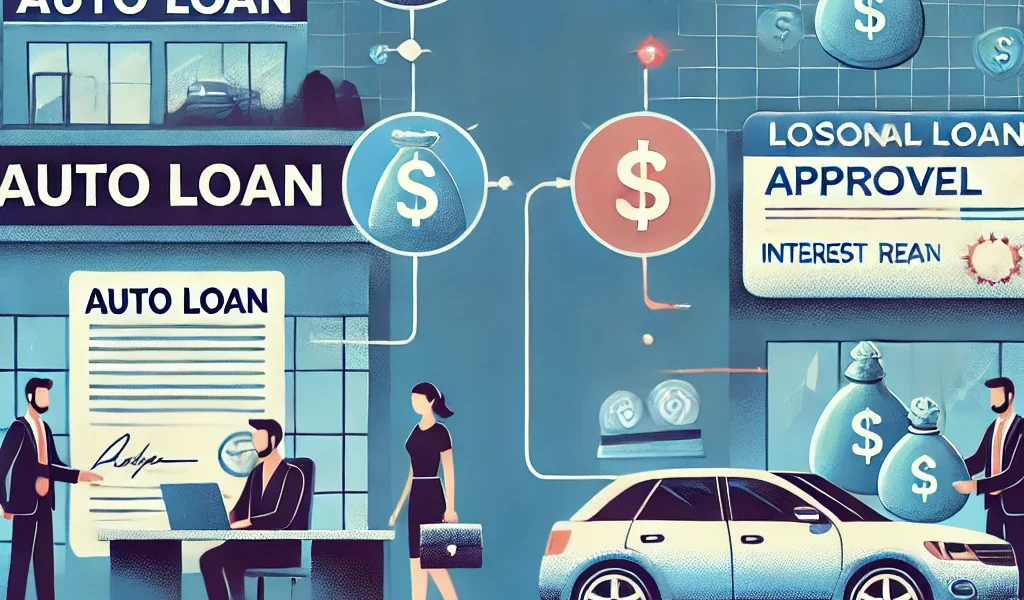Introduction
When purchasing a car, financing is one of the biggest decisions you’ll need to make. Two common financing options are auto loans and personal loans. Both have their own advantages and drawbacks, and choosing the right one depends on several factors such as interest rates, loan terms, credit requirements, and how you plan to use the loan.
In this guide, we will compare auto loans and personal loans for car purchases, discussing their benefits, drawbacks, eligibility requirements, and which option suits different financial situations.
1. What is an Auto Loan?
An auto loan is a secured loan specifically designed for purchasing a vehicle. The lender provides funds to buy the car, and the vehicle itself serves as collateral until the loan is paid off. If the borrower defaults on payments, the lender has the right to repossess the car.
Pros of Auto Loans
✔ Lower Interest Rates – Auto loans typically offer lower interest rates since they are secured loans. ✔ Fixed Repayment Terms – Most auto loans come with fixed interest rates and predictable monthly payments. ✔ Easier Approval – Lenders are more willing to approve auto loans because they are backed by collateral. ✔ Available Through Dealerships – Many car dealerships offer financing options through banks or credit unions.
Cons of Auto Loans
✘ Restricted Use – The loan can only be used to purchase a vehicle, limiting flexibility. ✘ Vehicle Ownership Restrictions – Until the loan is fully repaid, the lender holds a lien on the car. ✘ Potential for Repossession – If payments are not made, the lender can repossess the vehicle.
2. What is a Personal Loan?
A personal loan is an unsecured loan that can be used for various purposes, including purchasing a car. Unlike an auto loan, a personal loan does not require collateral, meaning the lender cannot seize your vehicle if you fail to make payments.
Pros of Personal Loans
✔ No Collateral Required – The borrower owns the car outright from day one. ✔ More Flexible Usage – The loan can be used for other expenses, such as repairs, insurance, or registration. ✔ No Vehicle Restrictions – You can purchase a used or older car that might not qualify for an auto loan. ✔ Quick Approval Process – Many online lenders provide fast approval and funding within a few days.
Cons of Personal Loans
✘ Higher Interest Rates – Since personal loans are unsecured, they typically come with higher interest rates. ✘ Stricter Credit Requirements – Borrowers need a strong credit history to secure low-interest rates. ✘ Shorter Loan Terms – Personal loans often have shorter repayment terms, leading to higher monthly payments.
3. Key Differences Between Auto Loans and Personal Loans
| Feature | Auto Loan | Personal Loan |
|---|---|---|
| Loan Type | Secured | Unsecured |
| Interest Rates | Lower | Higher |
| Credit Score Requirement | Moderate | Higher |
| Collateral Needed? | Yes | No |
| Usage Restrictions | Car purchase only | Can be used for anything |
| Loan Term | Longer (up to 7 years) | Shorter (typically 1-5 years) |
| Approval Speed | Moderate | Fast (often instant) |
4. Which Loan is Better for Your Situation?
Auto Loans are Best For:
✅ Buyers who want a lower interest rate and affordable monthly payments. ✅ Those looking for a structured loan repayment plan with fixed terms. ✅ People with moderate credit scores who may not qualify for an unsecured personal loan. ✅ Buyers purchasing new or certified pre-owned vehicles from dealerships.
Personal Loans are Best For:
✅ Buyers purchasing an older or used car that doesn’t qualify for an auto loan. ✅ Those with excellent credit scores who can secure low-interest personal loans. ✅ People who want ownership of the car immediately without lender restrictions. ✅ Buyers needing additional funds for car-related expenses such as insurance, repairs, or modifications.
5. How to Choose the Best Loan Option?
1️⃣ Compare Interest Rates – Always check the interest rates for both options. Auto loans usually have lower rates than personal loans. 2️⃣ Consider Your Credit Score – If you have a low credit score, an auto loan is a safer option. If you have excellent credit, you might get a competitive personal loan rate. 3️⃣ Think About Loan Terms – Auto loans generally offer longer repayment terms, making monthly payments more affordable. 4️⃣ Assess Your Financial Needs – If you need flexibility for additional expenses, a personal loan might be a better choice. 5️⃣ Evaluate Down Payment Requirements – Auto loans often require a down payment, whereas personal loans do not.
6. Frequently Asked Questions (FAQs)
1. Can I get an auto loan for a used car?
Yes, many lenders provide auto loans for used cars, but they may have restrictions on the car’s age and mileage.
2. Which loan is easier to get approved for?
Auto loans are generally easier to get approved for because they are secured loans, whereas personal loans require a stronger credit profile.
3. What happens if I default on an auto loan?
If you default on an auto loan, the lender can repossess your vehicle to recover their losses. With a personal loan, there is no repossession risk, but your credit score will suffer.
4. Are there any fees associated with these loans?
Yes, both loans may have origination fees, late payment fees, and prepayment penalties. Always review the loan terms before signing.
5. Can I refinance my loan later?
Yes, both auto loans and personal loans can be refinanced to secure a lower interest rate or better terms if your credit score improves.
Conclusion
Both auto loans and personal loans have advantages and disadvantages when it comes to financing a car purchase. The right choice depends on factors such as your credit score, interest rates, loan terms, and how much flexibility you need.
- If you want lower interest rates and structured payments, an auto loan is the better choice.
- If you need flexibility and don’t want to use the car as collateral, a personal loan might be the right option.
Before deciding, compare offers from different lenders and choose a loan that fits your financial situation. Always read the terms carefully and ensure you can comfortably afford the repayments to avoid financial stress.
Disclaimer:
This article is for informational purposes only. Loan terms, interest rates, and approval criteria may vary by lender and individual financial situations. Always consult with a financial expert or lender before making a borrowing decision.




